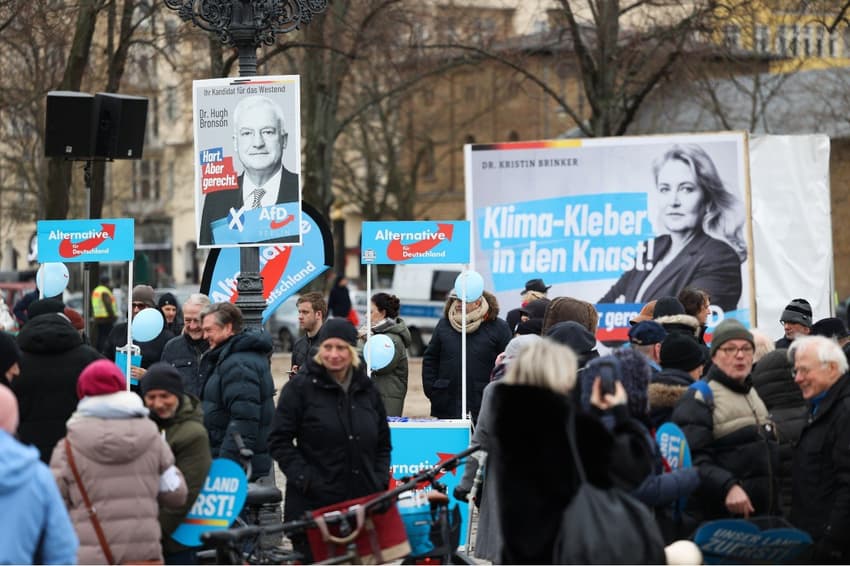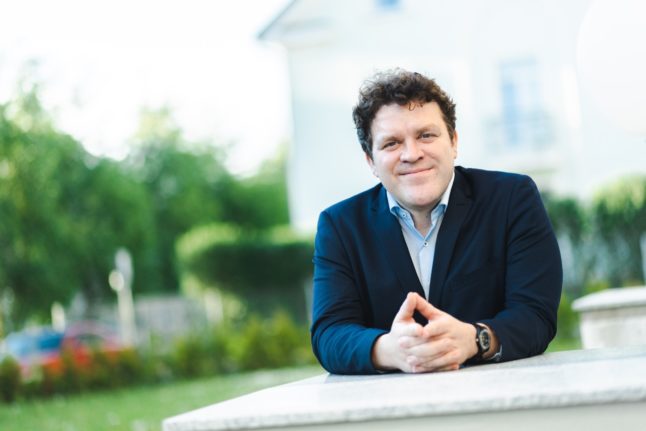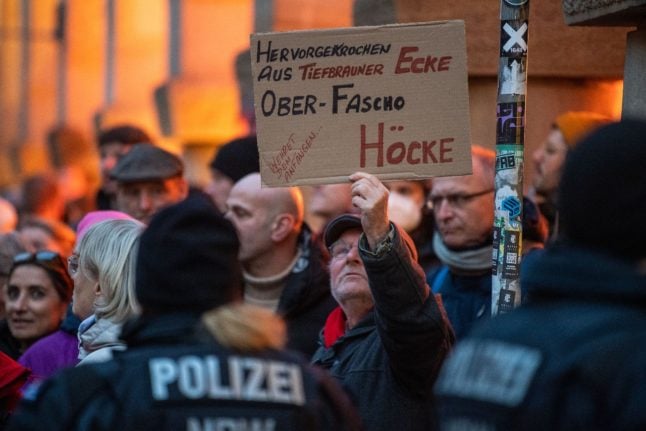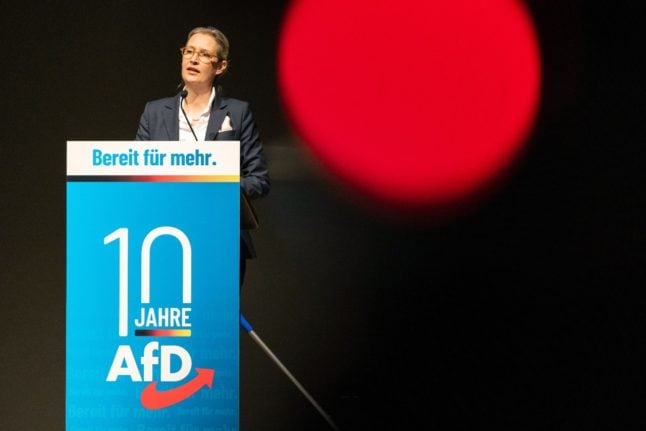‘Here to stay’: How the far-right AfD became a strong political force in Germany

The far-right Alternative for Germany (AfD) party has gained an increasingly strong foothold in German politics. How did it go from being a little-known Eurosceptic party to a prominent political force in the space of a single decade?
Ten years ago, on February 6th, 2013, a group of disgruntled Eurosceptics founded a new party as a vehicle for protests against the European currency union and bailouts to struggling economies.
The Alternative for Germany (AfD) - a play on Angela Merkel's claim that there was no "alternative" to financial aid for Greece - was the project of economics professor Bernd Lucke, journalist Konrad Adam and former CDU member Alexander Gauland.
It combined free-market economics with calls for an orderly exit from the Eurozone - but its dry economic message was largely confined to an audience of fringe academics in stuffy backrooms and lecture halls.
A decade on - as the party celebrates its tenth anniversary - all three founding members have left, and the party is almost unrecognisable.
"Originally there was one agenda: Euroscepticism," political scientist Florian Hartleb told The Local's Germany in Focus podcast. "But all the former leaders have stepped out of the party and the AfD is now what we’re describing within Europe as a radical right-wing, populist, or even now extremist party."
At the same time, Hartleb says, the AfD has become an undeniably powerful force in German politics. They've entered the national parliament, unleashed a groundswell of support in eastern German states like Saxony and Brandenburg and in Thuringia, they have even become the largest party.
READ ALSO: 'Yes to Dexit': Germany's far-right AfD firms up election strategy
Growing support
So, how did the face of the AfD change so much over the past ten years - and how has it managed to gain such a strong influence in German politics?
According to Hartleb, there are multiple answers to this - from the Covid pandemic to disillusionment with left-leaning politics.
However, it's not hard to trace the AfD's biggest upswing in support back to the migrant crisis of 2015.
"It’s very simple: in the summer of 2015, the AfD was at three percent in the polls," he says. "Then, after everything started, in the autumn and winter of 2015 and 2016, the AfD entered all the state parliaments and eventually also the Bundestag."

Political scientist Florian Hartleb. Photo: Enriko Lill
As Hartleb sees it, the influx of Syrian refugees into Germany - combined with a seeming unwillingness of mainstream politics to address the topic - ended up giving the AfD an opening.
"Of course, the topic of migration is very sensitive in Germany," Hartleb explains. "In the past years, we’ve had Islamist attacks in Germany, but since the topic is so sensitive, political decision-makers try not to make any connection between migration and crimes and this actually gives the AfD a platform."
In the winter of 2015, following a reversal in their political fortunes, AfD co-founder Gauland would go on to describe the crisis as a "gift" to the party.
READ ALSO: Germany's far-right AfD 'placed under surveillance'
Extremist ideologies
Another key change that has helped the AfD gain support - particularly in eastern states - is the fact that it has found a way to connect on a local and regional level.
"At the beginning, the AfD was more of a phantom party, so you didn’t know the leaders, you didn’t know the people who were running, they weren’t in the clubs, they weren’t public figures," says Hartleb.
"Now, three decades after reunification, we're still seeing a West-East divide, and just like the post-communist party (Die Linke), we're seeing that the AfD is particularly strong in local areas - so they’ve basically grown their support with local personalities."
One such personality is Björn Höcke. Born in Thuringia - where the AfD is a prominent force - Höcke has become a resilient but controversial figure in German politics, stirring up controversy with his nationalist views and statements promoting ethnic homogeneity in Germany.
The AfD politician also caused uproar in 2017 after describing Berlin's Holocaust Memorial as a "monument of shame" and calling an end to Germany's post-Nazi era culture of remembrance.
These days, his far-right wing of the party - Der Flügel - is widely considered to be pulling the strings in the AfD. It's a wing of the party that Hartleb describes as "dangerous" - so much so that its members are subject to surveillance by the German authorities.

A man holds a sign describing Björn Höcke as a "fascist" at an anti-AfD protest in Hesse. Photo: picture alliance/dpa | Lino Mirgeler
The party also has links to the extremist Reichsbürger - or state-denier - movement: a group that claims that modern Germany isn't a legitimate state, but rather a vassal of the Allied Forces after the Second World War.
Back in December, the movement was associated with a far-right plot to overthrow German democracy - and a former AfD politician was one of the figures at the centre of it.
READ ALSO: Who was involved in the alleged plot to 'overthrow German democracy'?
But despite the transition from Eurosceptic to right-wing populist and even extremist politics, Hartleb notes that attempts to shut the AfD out of the German political system have failed.
"From the perspective of the liberal democracy and also for the protection of our constitution, nothing has worked out," he says. "The AfD is powerful - it got stronger in the light of the pandemic - and at the moment, the AfD is the strongest force in Thuringia, where Björn Höcke is from."
🎧 New episode!
- How has the AfD party evolved over 10 years? @FlorianHartleb explains.
- Berlin chaos means fresh elections
- Influx of STEM workers from abroad
- How popular is American football in Germany?
- Romantic phrases
LISTEN: https://t.co/XhR9UkXNcP pic.twitter.com/TKZCoRDDQb
— Germany in Focus (@germanyinfocus_) February 10, 2023
Excluded
As around 300 party members gathered in the Hessian town of Königstein to celebrate the AfD's ten-year anniversary on February 6th, the message from party leader Alice Weidel was: "We're here to stay."
Other mainstream political parties in Germany have all categorically ruled out working with the AfD in a coalition, meaning that - short of getting an outright majority - they are likely to be shut out of government for the foreseeable future.
But according to Hartleb, the party is likely to occupy a prominent place in German politics for many years to come - despite attempts to marginalise them.

AfD leader Alice Weidel gives a speech at the party's 10-year anniversary celebrations in Königstein. Photo: picture alliance/dpa | Hannes P Albert
"They’re here to stay because there’s a gap in the party system," he says. "Hendrik Wüst, the state premier of North Rhine-Westphalia, basically said a couple of months ago that the CDU is not a conservative party anymore, so we see that there is some kind of demand, as well as a nostalgia to have back the good old times."
This - combined with uncertainty about Germany's future direction and place on the world stage - should continue to give the AfD a place in German politics.
"The AfD is a right-wing radical party, and it would harm the reputation (of Germany) if they entered government," says Hartleb. "They are also dangerous in that sense that they polarise society and they’re dealing with fake news.
"But there are many obstacles and uncertainties and that’s why the AfD will stay. They will be excluded but they will continue to be an important factor in German politics."
Comments
See Also
Ten years ago, on February 6th, 2013, a group of disgruntled Eurosceptics founded a new party as a vehicle for protests against the European currency union and bailouts to struggling economies.
The Alternative for Germany (AfD) - a play on Angela Merkel's claim that there was no "alternative" to financial aid for Greece - was the project of economics professor Bernd Lucke, journalist Konrad Adam and former CDU member Alexander Gauland.
It combined free-market economics with calls for an orderly exit from the Eurozone - but its dry economic message was largely confined to an audience of fringe academics in stuffy backrooms and lecture halls.
A decade on - as the party celebrates its tenth anniversary - all three founding members have left, and the party is almost unrecognisable.
"Originally there was one agenda: Euroscepticism," political scientist Florian Hartleb told The Local's Germany in Focus podcast. "But all the former leaders have stepped out of the party and the AfD is now what we’re describing within Europe as a radical right-wing, populist, or even now extremist party."
At the same time, Hartleb says, the AfD has become an undeniably powerful force in German politics. They've entered the national parliament, unleashed a groundswell of support in eastern German states like Saxony and Brandenburg and in Thuringia, they have even become the largest party.
READ ALSO: 'Yes to Dexit': Germany's far-right AfD firms up election strategy
Growing support
So, how did the face of the AfD change so much over the past ten years - and how has it managed to gain such a strong influence in German politics?
According to Hartleb, there are multiple answers to this - from the Covid pandemic to disillusionment with left-leaning politics.
However, it's not hard to trace the AfD's biggest upswing in support back to the migrant crisis of 2015.
"It’s very simple: in the summer of 2015, the AfD was at three percent in the polls," he says. "Then, after everything started, in the autumn and winter of 2015 and 2016, the AfD entered all the state parliaments and eventually also the Bundestag."

As Hartleb sees it, the influx of Syrian refugees into Germany - combined with a seeming unwillingness of mainstream politics to address the topic - ended up giving the AfD an opening.
"Of course, the topic of migration is very sensitive in Germany," Hartleb explains. "In the past years, we’ve had Islamist attacks in Germany, but since the topic is so sensitive, political decision-makers try not to make any connection between migration and crimes and this actually gives the AfD a platform."
In the winter of 2015, following a reversal in their political fortunes, AfD co-founder Gauland would go on to describe the crisis as a "gift" to the party.
READ ALSO: Germany's far-right AfD 'placed under surveillance'
Extremist ideologies
Another key change that has helped the AfD gain support - particularly in eastern states - is the fact that it has found a way to connect on a local and regional level.
"At the beginning, the AfD was more of a phantom party, so you didn’t know the leaders, you didn’t know the people who were running, they weren’t in the clubs, they weren’t public figures," says Hartleb.
"Now, three decades after reunification, we're still seeing a West-East divide, and just like the post-communist party (Die Linke), we're seeing that the AfD is particularly strong in local areas - so they’ve basically grown their support with local personalities."
One such personality is Björn Höcke. Born in Thuringia - where the AfD is a prominent force - Höcke has become a resilient but controversial figure in German politics, stirring up controversy with his nationalist views and statements promoting ethnic homogeneity in Germany.
The AfD politician also caused uproar in 2017 after describing Berlin's Holocaust Memorial as a "monument of shame" and calling an end to Germany's post-Nazi era culture of remembrance.
These days, his far-right wing of the party - Der Flügel - is widely considered to be pulling the strings in the AfD. It's a wing of the party that Hartleb describes as "dangerous" - so much so that its members are subject to surveillance by the German authorities.

The party also has links to the extremist Reichsbürger - or state-denier - movement: a group that claims that modern Germany isn't a legitimate state, but rather a vassal of the Allied Forces after the Second World War.
Back in December, the movement was associated with a far-right plot to overthrow German democracy - and a former AfD politician was one of the figures at the centre of it.
READ ALSO: Who was involved in the alleged plot to 'overthrow German democracy'?
But despite the transition from Eurosceptic to right-wing populist and even extremist politics, Hartleb notes that attempts to shut the AfD out of the German political system have failed.
"From the perspective of the liberal democracy and also for the protection of our constitution, nothing has worked out," he says. "The AfD is powerful - it got stronger in the light of the pandemic - and at the moment, the AfD is the strongest force in Thuringia, where Björn Höcke is from."
🎧 New episode!
— Germany in Focus (@germanyinfocus_) February 10, 2023
- How has the AfD party evolved over 10 years? @FlorianHartleb explains.
- Berlin chaos means fresh elections
- Influx of STEM workers from abroad
- How popular is American football in Germany?
- Romantic phrases
LISTEN: https://t.co/XhR9UkXNcP pic.twitter.com/TKZCoRDDQb
Excluded
As around 300 party members gathered in the Hessian town of Königstein to celebrate the AfD's ten-year anniversary on February 6th, the message from party leader Alice Weidel was: "We're here to stay."
Other mainstream political parties in Germany have all categorically ruled out working with the AfD in a coalition, meaning that - short of getting an outright majority - they are likely to be shut out of government for the foreseeable future.
But according to Hartleb, the party is likely to occupy a prominent place in German politics for many years to come - despite attempts to marginalise them.

"They’re here to stay because there’s a gap in the party system," he says. "Hendrik Wüst, the state premier of North Rhine-Westphalia, basically said a couple of months ago that the CDU is not a conservative party anymore, so we see that there is some kind of demand, as well as a nostalgia to have back the good old times."
This - combined with uncertainty about Germany's future direction and place on the world stage - should continue to give the AfD a place in German politics.
"The AfD is a right-wing radical party, and it would harm the reputation (of Germany) if they entered government," says Hartleb. "They are also dangerous in that sense that they polarise society and they’re dealing with fake news.
"But there are many obstacles and uncertainties and that’s why the AfD will stay. They will be excluded but they will continue to be an important factor in German politics."
Join the conversation in our comments section below. Share your own views and experience and if you have a question or suggestion for our journalists then email us at [email protected].
Please keep comments civil, constructive and on topic – and make sure to read our terms of use before getting involved.
Please log in here to leave a comment.